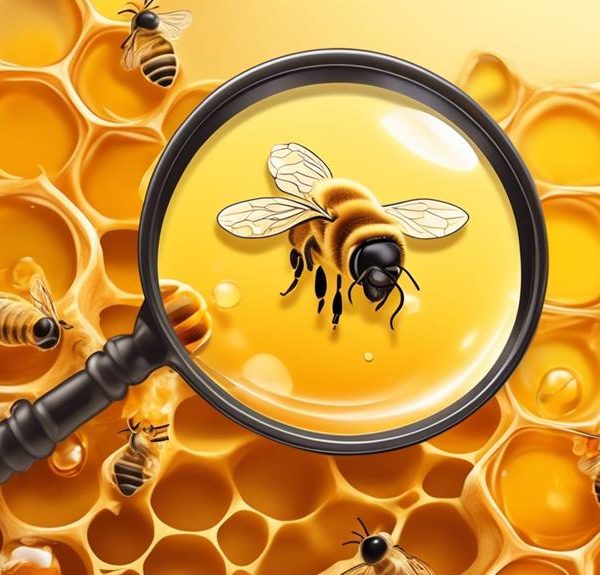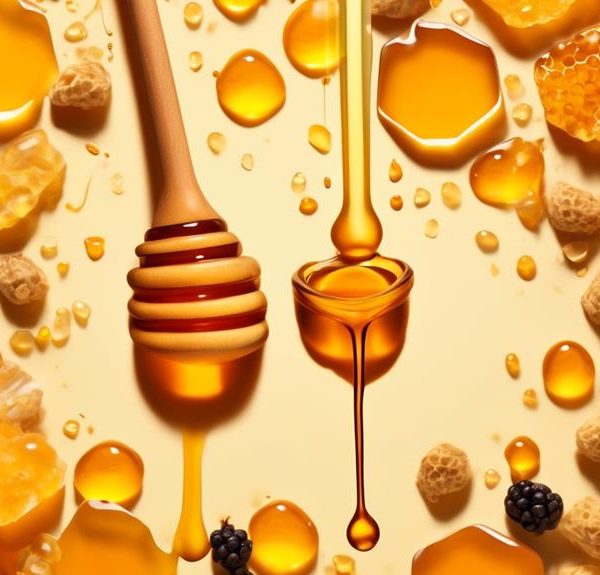Uncover the surprising truth about honey's complex nutritional profile, including its potential saturated fats, in our revealing exploration.
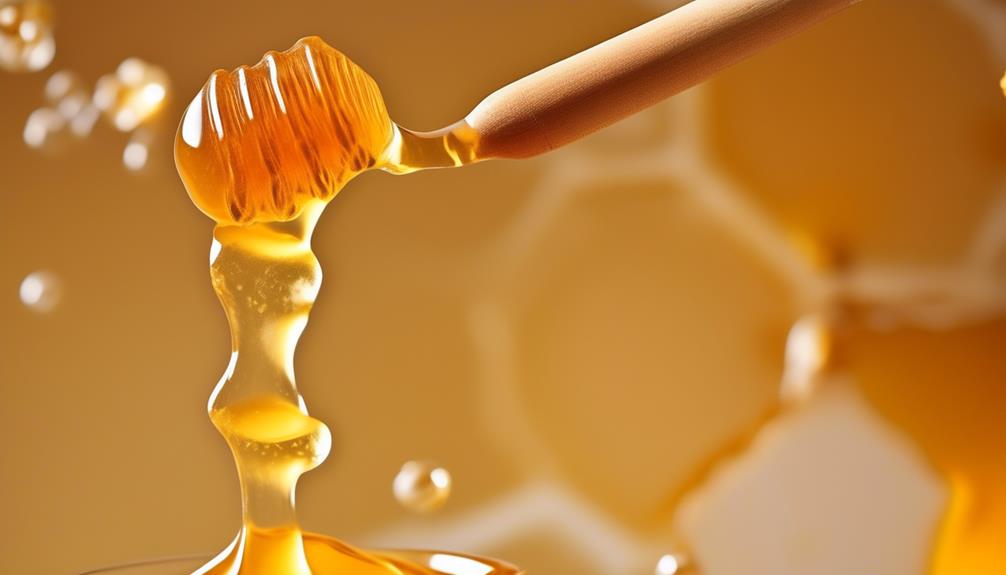
Are There Saturates in Honey
You might not be aware, but the sweet, golden honey you drizzle on your morning toast or stir into your tea may contain saturated fats. It's a surprising revelation, isn't it?
We typically associate saturates with fatty meats or indulgent desserts, not an all-natural product like honey. But before you rush to discard your honey jars, it's vital to understand the full context.
Honey's nutritional profile is complex, and its potential saturates might not be as alarming as you'd think. Curious to find out why? Let's explore further.
Key Takeaways
- Saturated fats in honey are minimal and provide some energy and support for cell growth.
- Honey is primarily composed of sugars like fructose and glucose, along with minor amounts of vitamins, minerals, and antioxidants.
- Compared to other sweeteners, honey offers a superior nutritional profile despite its calorie content.
- Consuming honey in moderation is important to prevent weight gain and maintain overall health.
Understanding Saturated Fats
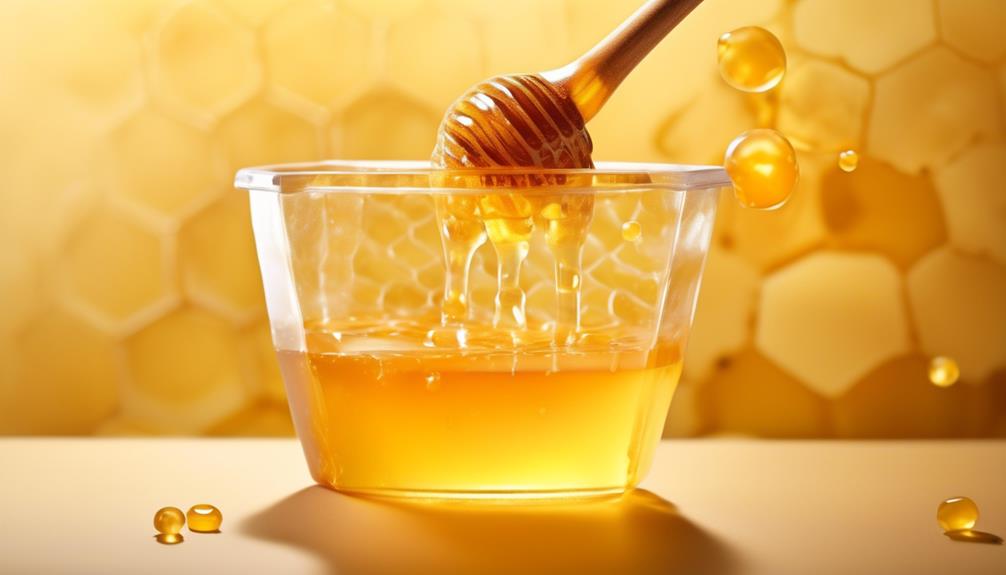
When it comes to understanding saturated fats, it's essential to know that these are types of fats that are typically solid at room temperature and are found in various foods, including honey.
You might be wondering, 'how can a liquid like honey contain saturated fats?' Well, it's all about the chemical structure of these fats. They're called 'saturated' because every available carbon bond is occupied by a hydrogen atom, leaving no room for any additional hydrogen atoms. This configuration results in a stable structure, which remains solid at room temperature.
So, while honey is liquid, it does contain small amounts of these stable fats. However, you shouldn't worry too much about this. The presence of these fats in honey is minimal and won't significantly contribute to your daily saturated fat intake.
Analyzing the saturated fats in honey, it's critical to note that they're not all bad. Some saturated fats, like those found in honey, can contribute to your health by providing energy and supporting cell growth. Therefore, when considering honey's saturated fats, it's important to take a balanced view that considers both their quantity and their potential health benefits.
Nutritional Breakdown of Honey

Building on our understanding of saturated fats in honey, let's now examine the broader nutritional profile of this sweet substance. You'll find that honey is not just a simple sweetener, it's a complex food with a rich nutritional makeup.
Here's a simple breakdown:
Nutrient | Amount per 1 tbsp |
|---|---|
Calories | 64 |
Protein | 0.06g |
Fat | 0g |
Carbohydrates | 17.3g |
Sugars | 17.25g |
As you can see, honey is primarily composed of sugars, specifically fructose and glucose. These sugars, unlike refined sugar, come along with minor amounts of vitamins, minerals, and antioxidants.
The nutritional value of honey, however, doesn't stop at its macronutrients. It also contains trace amounts of vitamins and minerals such as Vitamin C, Calcium, and Iron. Additionally, honey has a variety of antioxidants, which are substances that can protect your cells against free radicals, unstable molecules that can cause damage to cells in your body.
Role of Saturates in Honey
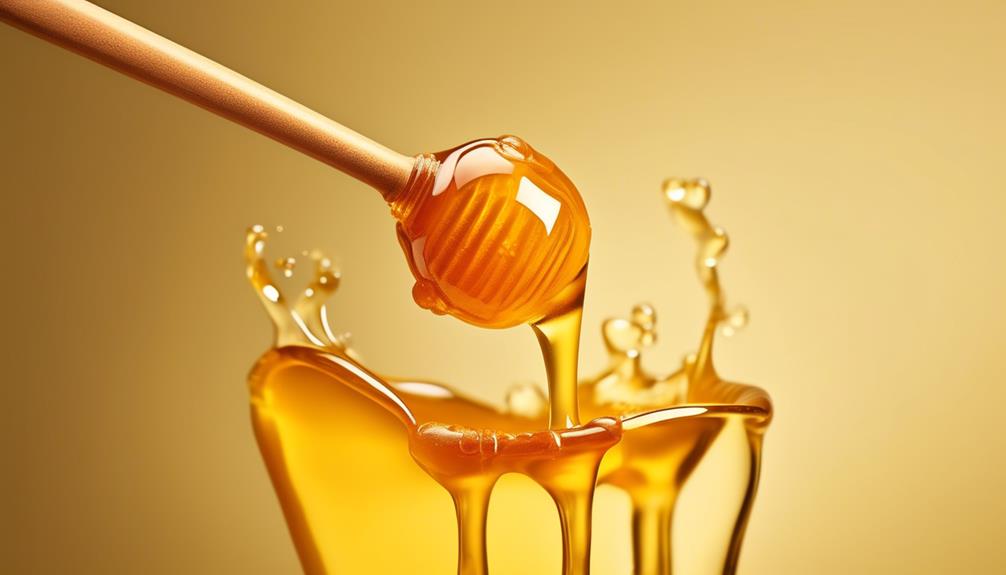
Despite its lack of saturated fats, honey plays a crucial role in your diet thanks to its wealth of other nutritional benefits. It's packed with antioxidants, which help protect your body from cell damage due to free radicals. With anti-inflammatory properties, honey can help combat chronic diseases and improve your overall health.
Now, you may wonder about the role of saturates, considering honey doesn't have any. In general, saturated fats are essential for your body's function, but their absence in honey doesn't cause any deficiency. Why? Because you're likely getting enough from other sources in your diet.
However, it's the lack of saturates that makes honey a healthier sweetener option. Unlike table sugar and high-fructose corn syrup, honey won't contribute to unhealthy cholesterol levels. It provides the sweetness you crave, without the harmful effects of saturated fats.
In a nutshell, honey, without saturates, still shines in your diet. It offers a healthier alternative to other sweeteners, while delivering a host of nutrients and health benefits. So, it's not the saturates, but what honey does contain that makes it a sweet deal for your health.
Honey Vs Other Sweeteners

Comparing honey to other sweeteners, you'll find it's not just a healthier choice due to its lack of saturates, but also for its superior nutritional profile. Unlike refined sugars, honey contains essential nutrients such as vitamins B and C, minerals like magnesium and potassium, and antioxidants that are beneficial for your health.
Take a look at artificial sweeteners like aspartame and sucralose. While they're zero-calorie options, they don't offer any nutritional benefits. In fact, research suggests they may even have detrimental health impacts. On the other hand, honey, even with its calories, provides a host of health benefits.
But what about natural sweeteners like maple syrup or agave nectar? While they're certainly better than artificial sweeteners, they still don't quite stack up to honey. They contain fewer vitamins and minerals, and often more sugar.
Health Implications of Honey's Saturates
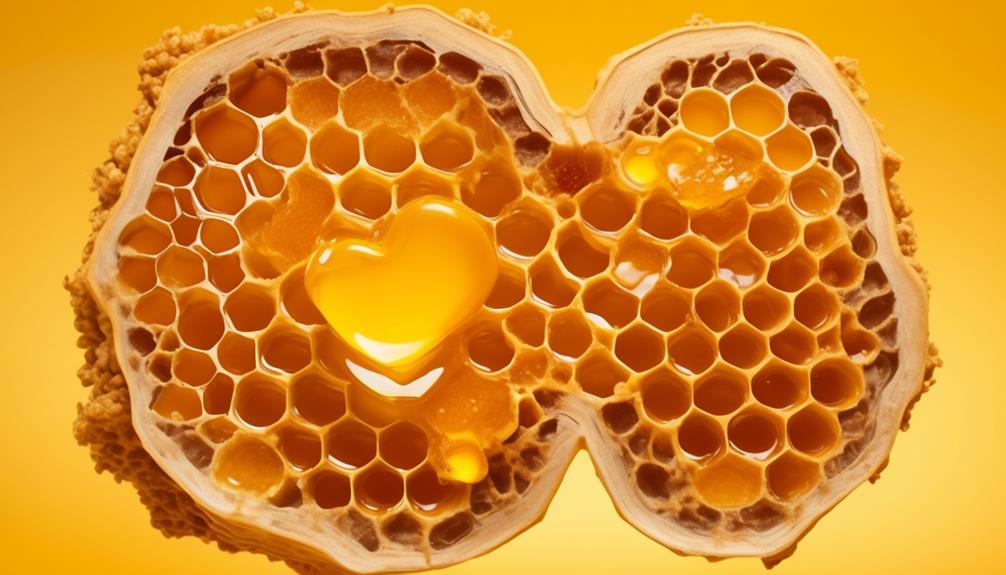
Shifting our focus from the comparison of honey and other sweeteners, let's examine the health implications of the negligible saturates in honey. You might wonder, "Do these minute amounts of saturates even matter?" They do, and here's why.
Saturated Fats | Effects | Honey |
|---|---|---|
High intake | Increases LDL cholesterol | Negligible amounts |
Low intake | Decreases LDL cholesterol | Ideal choice |
Moderate intake | Balance of LDL cholesterol | Possible with controlled consumption |
Unchecked intake | Risk of heart disease | Minimal risk due to low saturates |
Controlled intake | Healthy heart | Promotes heart health |
Despite honey's low saturates, it's important you consume it in moderation. It's not free from calories, and excessive intake can lead to weight gain. Honey's sugar should also be accounted for in your daily sugar intake. Remember, it's the balance of all nutrients that promotes overall health.
Conclusion
So, you've learned that honey contains negligible amounts of saturates. It's much healthier compared to other sweeteners, especially those loaded with unhealthy fats.
However, don't forget that honey is still sugar and should be consumed in moderation. Its minimal saturates aren't a health concern, but excessive consumption could lead to other issues.
So, enjoy your honey, but remember, balance is always key in maintaining a healthy diet.

